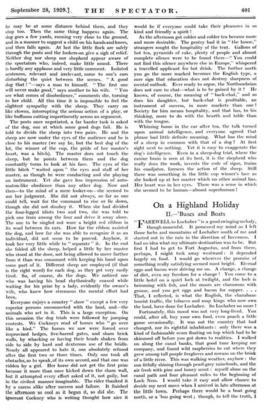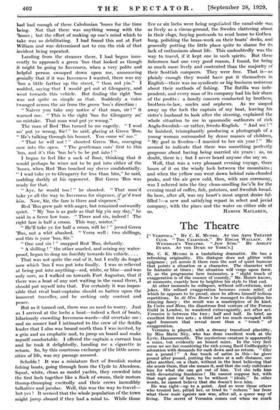On a Highland Holiday II.—'Buses and Boats "F AREWELL to Lochaber
"is a good swinging melody, though mournful. It possessed my mind. as I left those lochs and mountains of Lochaber south of me and started out in the rain in the direction of Inverness. I had no idea what my ultimate destination was to be. But first I had to get to Fort Augustus, and from there, perhaps, I might trek away westward : it depended largely on food. I would go wherever the promise of something really satisfying seemed most bright. Eternal eggs and bacon were driving me on. A change, a change of diet, even my freedom for a change ! You come to a little hotel on a quiet loch at twilight, and the loch is brimming with fish, and the moors are clamorous with grouse, and you get eggs and bacon for supper. . . That, I reflected, is what the English, the charabanc tourist traffic, the tobacco and soap kings who now own the land, have done for Lochaber. So Lochaber no more !
Fortunately, this mood was not very long-lived. You could, after all, buy your own food, even poach a little game occasionally. It was not the country that had changed, nor its rightful inhabitants : only there was a kind of fashionable scum floating on top which had to be skimmed off before you got down to realities. I walked on along the canal banks, that good tune keeping me company, and found wild raspberries to eat where they grew among tall purple foxgloves and rowans on the brink -of a little river. This was walking weather, anyhow : the sun fitfully shining through pearl-grey rainclouds, and the air fresh with pine and honey scent : myself alone on the canal path and four pleasant miles to the beginning of Loch Ness. I would take it easy and allow chance to decide my next move when. I arrived in late afternoon at the little town. Perhaps there would be a boat going north, or a 'bus going west ; though, to tell the truth, I had had enough of these Caledonian 'buses for the time being. Not that there was anything wrong with the 'buses ; but the effort of making up one's mind which to take was so debilitating. I hid found this out at Fort William and was determined not to run the risk of that incident being repeated.
Landing from the steamer there, I had begun inno- cently to approach a green 'bus that looked as though it might be going to Inverness, when a very polite and helpful person swooped down upon me, announcing genially that if it was Inverness I wanted, there was my 'bus a little farther up the street, " thon red yin." I nodded, saying that I would get out at Glengarry, and went towards this vehicle. But finding the right 'bus was not quite so simple as that. Suddenly a voice twanged across the air from the green 'bus's direction : " Naiver you take ony. notice o' that man, sir ! " it warned me. " This is the right 'bus for Glengarry 'an' no mistake. That man wud put ye wrong."
The man of Red 'Bus turned to me eagerly. " I wud no' put ye wrong, Sir !" he said, glaring at Green 'Bus. " He's talking through his bonnet. You come wi' me."
" That he will not ! " shouted Green 'Bus, emerging now into the open. " The gentleman cam' first to this 'bus, and it's this 'bus he's to be put into ! "
I began to feel like a sack of flour, thinking that it would perhaps be wiser not to be put into. either of the 'buses, when Red 'Bus touched my sleeve confidentially. " I wud take ye to Glengarry for less than him," he said, nodding darkly at his. opponent. But Green 'Bus was ready for that.
" Aye, he would too ! he shouted. " That man'd take ye all the way to Inverness for sixpence, if ye'd trust him. Now, Sir, the fare is three and sixpence."
Red 'Bus grew pale with anger, but remained outwardly quiet. " My 'bus is as gude as that big yin any day," he said in a fierce low tone. " three and six, indeed ! The right fare is half a croon. This way, mister."
" He'll'take ye. for half a croon, will he ! " jeered Green 'Bus, not a whit abashed. " \Terra well : two shillings, and this is your 'bus, Sir."
" One and six ! " snapped Red 'Bus, defiantly.
" A shilling ! " the other snarled, and seizing my water- proof, began to drag me forcibly towards his vehicle. . . .
That was not quite the end of it, but I really do forget now which 'bus I was put into finally. I was so relieved at being put into anything—red, white, or blue—and was only sure, as I walked on towards Fort Augustus, that if there was a boat of any sort waiting in the canal there, I should put myself into that. For certainly it was impos- sible that rival boat-captains should so batten upon the innocent traveller, and he seeking only content and peace.
But as it turned out, there was no need to worry. Just as I arrived at the lochs a boat—indeed a fleet of boats, hilariously crowding Inverness-wards--did overtake me ; and no sooner had I intimated to the crew of the flotilla leader that I also was bound north than I was invited, by a grin and an emphatic nod, to jump on board and make myself comfortable. I offered the captain a currant bun and he took it delightedly, handing me a cigarette in return. So, by this courteous exchange of the little neces- sities of life; was my passage assured.
Scholde ! It was a miniature fleet of Swedish motor fishing boats, going through from the Clyde to Aberdeen. Squat, white, clean as model yachts, they crowded into the first loch together like a flock of swans, their motors thump-thumping excitedly and their crews incredibly talkative and jocular. Well, this was the way to travel— but yes ! It seemed that the whole population of the town might jump aboard if they had a mind to. While those five. or six lochs were being negotiated the canal-side was as lively as a circus-ground, the Swedes clattering about in their -clogs,. buying postcards to send home to Gothen burg, polishing the brass-work on their boats' decks, and generally putting the little place quite to shame for its lack of enthusiasm about life.. Thig undoubtedly was the way to travel, if it kept one in such spirits. But these fishermen had one very good reason, I found, for being So much more lively and contented than the majority of their Scottish compeers. They were free. That ris—as plainly enough they would have put -it- theinselves in English-L-there was no syndicate or big business nonsense about their methods of fishing. The flotilla was inde- pendent, and every man of its company had his fair share of the profiti :' a family concern conducted. by. brothers, brothers-in-law, uncles and nephews. As we sooped away up the loch the captain of my boat, leaving his sister's husband to look- after the Steering, explained the whole situation to me in spasmodic outbursts of rich Anglo-Swedish—or rather, Swedo-English.- " And see ! '? he finished; triumphantly producing a photograph Of. a young woman surrounded by dense masses of children, " My gurl in Sveden—I married to her six year ! " He seemed to indicate that there was Something perfectly gorgeous about having being married six years : as, no doubt, there is ; but I never heard anyone else say-so.
Well, that was a very 'pleasant evening voyage, three hours of it on the windy loch between the mountains ; and when the yellow sun went down behind rain-clouded peaks, and the air grew cold, then, with rare ceremony, was I ushered into the tiny clean-smelling foc's'le for the evening meal of coffee, fish, potatoes, and Swedish bread. So here, after all, was my heart's most urgent desire ful- filled !—a new and satisfying repast in select and jovial company, with the pines and the water on either side of



































 Previous page
Previous page